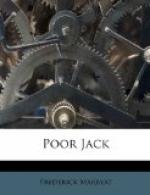“Have you no idea how many men were saved, Turner?”
“I only know this—that the Admiralty ordered five pounds a man to be given to the seamen who were saved, as a recompense for the loss of their clothes, and I heard that only seventy-five claimed it; but how many marines were saved, or other people who were on board, I do not know; but perhaps, altogether, there might be two hundred or more—for you see the seamen had the worst chance of being saved, as they were almost all down in the hold, or on the lower and main decks at their guns. A few days after the ship went down the bodies would come up, eight or ten almost the same time—rising to the top of the water so suddenly as to frighten people who were passing near. The watermen made a good thing of it; for, as the bodies rose, they took from them their shoe-buckles, money, and watches, and then towed them on shore to be buried.”
“That lieutenant had much to answer for,” observed Ben. “His false pride was the cause of it all.”
“It would seem so—but God only knows,” replied Anderson. “Come, my lads, the beer is out, and it’s two bells in the middle watch. I think we had better turn in. Jack, what’s to become of you?”
“Oh, I’ll find a plank,” said I.
“So you shall, boy, and a bed upon it,” replied Ben. “Come and turn in with me, and don’t you dream that the larboard lower deck ports are open.”
CHAPTER FOURTEEN
My Father makes his
Appearance, having left his Leg, but not his
Tail, behind him—My
Father is pensioned off by my Mother as well
as by his Country.
About six weeks after the intelligence of the battle of the Nile, as I was sweeping away from the steps the mud which had been left by the tide, a King’s tender, that I had been watching as she came up the river, dropped her anchor in the stream, abreast of the hospital.
Shortly afterward the lieutenant who commanded her pulled on shore in his boat, and, landing at the steps, proceeded to the governor’s house. The men having orders not to leave the boat, requested me to procure them some porter, which I did; and on my return with it, they informed me that they had come round from Portsmouth with sixty-three men, who had lost their limbs, or had been otherwise so severely wounded in the late action as to have been recommended for Greenwich.
I felt very anxious for the men to land, as it was possible that my father might be one of them. The lieutenant soon returned, jumped into the boat, and shoved off. I perceived that the disabled men were getting ready to land, hauling their chests and kits on deck. In about half-an-hour a boat full of them came to the steps. I ran down to assist; and as I held on to the gunnel of the boat, while they threw out their gang-board, the first person who stumped out was my father, minus his left leg.
“Father!” cried I, half sorry and half pleased.




